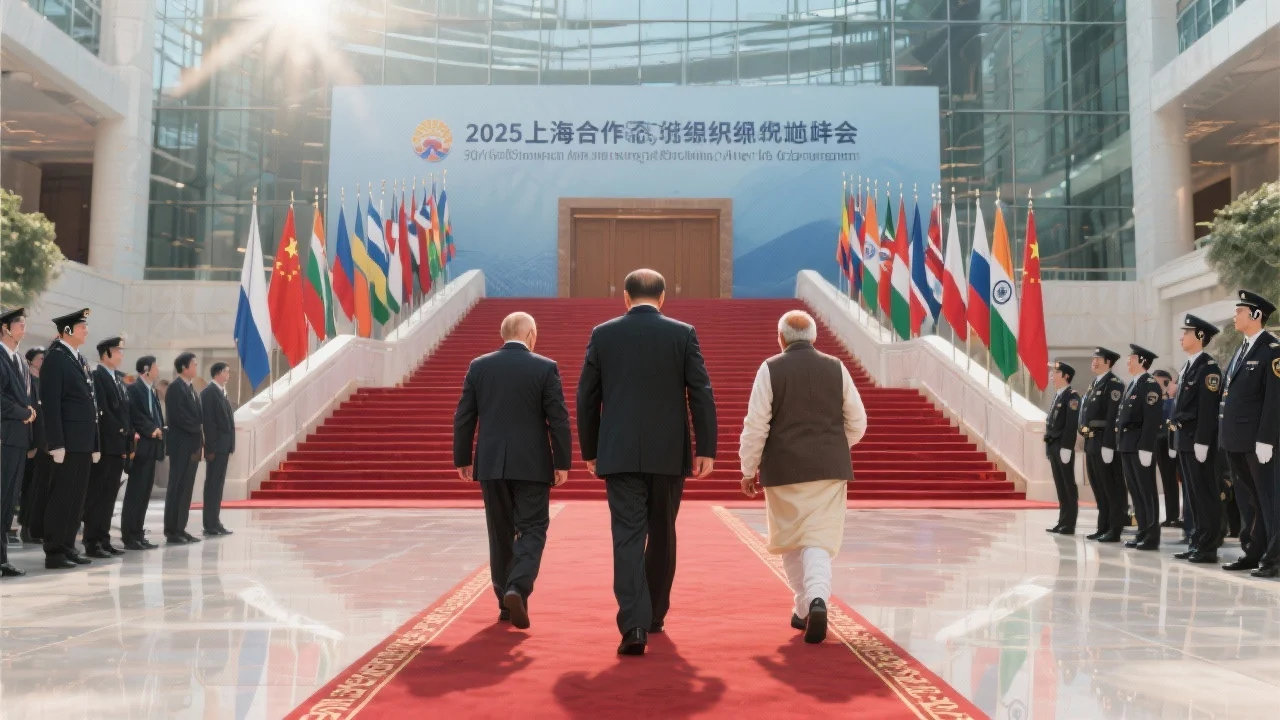
A stage set for multipolarity
In the northern Chinese city of Tianjin, Xi Jinping hosted more than 20 world leaders for the Shanghai Cooperation Organisation (SCO) summit.
It’s a gathering that looked less like a regional security forum and more like a geopolitical coming-out party for Beijing’s vision of a new global order. Sitting shoulder-to-shoulder with Vladimir Putin and joined by India’s Narendra Modi, Xi outlined a plan for what he called “equal and orderly multi-polarization,” a veiled but unmistakable repudiation of the U.S.-led system that has structured international politics since 1945.
The imagery mattered as much as the speeches: the leaders of China, Russia, and India walking together, hands briefly locked, as television cameras broadcasted a tableau of solidarity to a world where economic nationalism, tariffs, and war have eroded post-Cold War certainties.
Xi’s blueprint for the “Global South”
Xi’s message was clear: the rules should no longer be crafted in Washington or Brussels but recalibrated to reflect the majority world. He pledged billions in aid and loans to SCO nations, proposed an SCO development bank, and floated the idea of a shared artificial intelligence research hub. By explicitly framing these initiatives as “true multilateralism,” Xi cast the summit not just as an alliance meeting but as the launchpad for a new governing architecture centered in Eurasia.
The strategy hinges on a powerful logic: the “Global South” encompasses most of the world’s population and a majority of UN member states. Why, Xi asked implicitly, should a handful of wealthy Western democracies dictate the rules for all? His answer is a Sino-centric alternative—part financial bloc, part tech incubator, part political counterweight.
Putin’s harmonized grievance
Putin, still locked in the Ukraine war’s long tail, doubled down on his familiar narrative: NATO expansion provoked conflict, and the Euro-Atlantic security system is fundamentally broken. Casting the SCO as Eurasia’s answer to NATO, he claimed it could offer a “new system of stability” free from U.S. dominance.
That framing neatly dovetails with Xi’s in both cases, the target is not just Washington but the legitimacy of the Western-built post-war order. What Xi offers as a blueprint for development, Putin frames as a security bulwark. Together, they weave economic grievance with geopolitical grievance, each reinforcing the other.
Modi’s careful balancing act
India’s Narendra Modi attended his first China visit in seven years, a subtle but symbolic recalibration after years of frozen ties over border disputes and Beijing’s close partnership with Pakistan. His presence offered Xi and Putin a crucial photo opportunity. Yet Modi’s diplomacy reflected India’s hedging instincts: while tariffs from the U.S. have strained Delhi-Washington ties, India is still wary of being absorbed into China’s orbit. His posture was one of participation without full alignment, signaling India’s desire to be courted rather than claimed as per the New York Times.
Why this moment matters
For years, Beijing has rolled out initiatives with sweeping titles, the Belt and Road, the Global Security Initiative, the Global Development Initiative. What made Tianjin different was not just the policy packages, but the convergence of personalities and politics that hinted at a coalition-in-formation. Trump’s tariff shocks have dislocated traditional alliances and Xi is seizing that vacuum, using Putin’s estrangement from the West and Modi’s transactional pragmatism to reposition China as the anchor of a reshaped order.
Of course, the fractures remain obvious. China and India have fought bloody border skirmishes; Russia’s economic over-dependence on China leaves it more junior partner than equal; and many SCO states see membership as insurance rather than genuine ideological commitment. Still, the summit captured momentum, a generational moment where the “post-Western” conversation moved from academic conferences to televised reality.
The world after Tianjin
Whether the SCO becomes a fully fledged counterweight to NATO and the G7, or simply a diplomatic talk shop, will depend on whether Xi can sustain the coalition beyond subsidies and symbolism. But as tanks roll in Ukraine and tariffs multiply across continents, the Tianjin summit signals something more unsettling: for much of the world, Washington’s word no longer carries the final authority.
In Xi’s telling, the world is no longer bipolar or unipolar, it is something else entirely, something undefined but decidedly not American. The open question is whether this vision reflects the birth of a durable multipolar system or simply a transactional alignment of states bound more by resentment of the West than by coherence of purpose.
